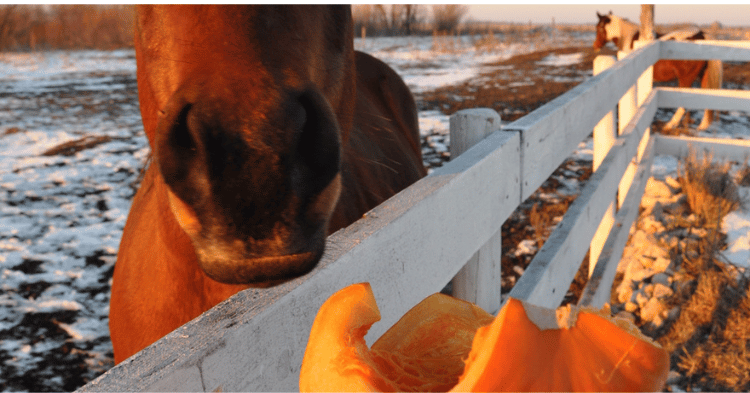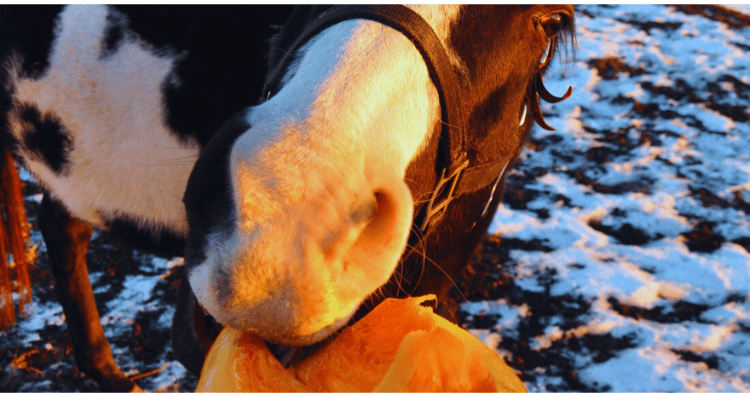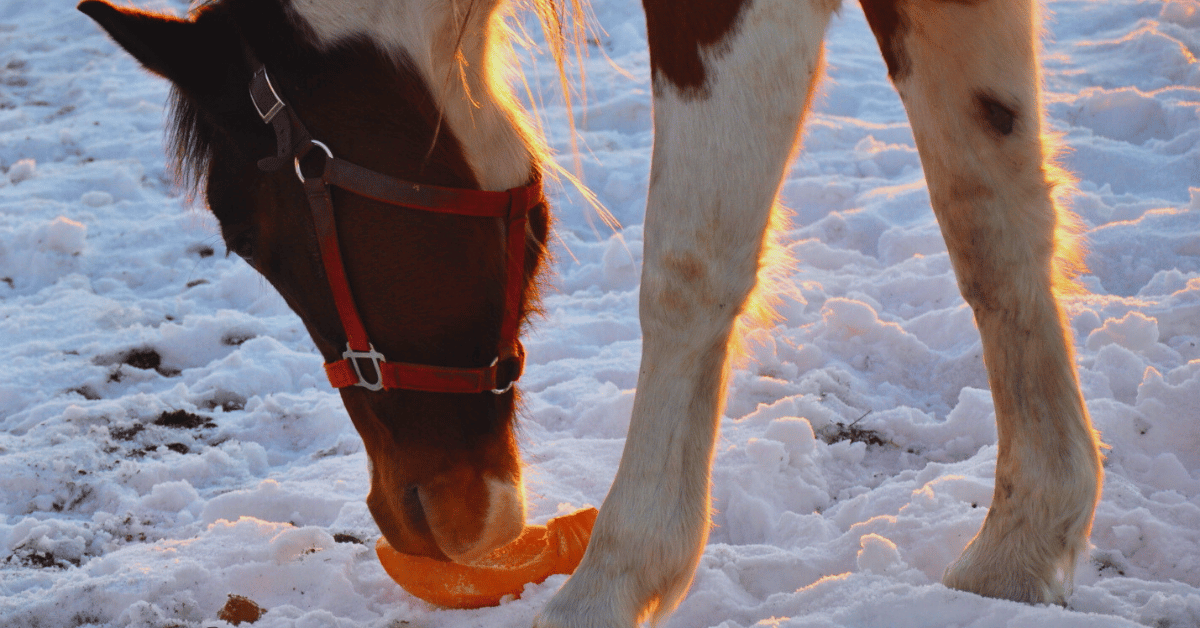As autumn rolls in, the question arises: can horses eat pumpkin, and is it a safe treat? The good news is yes! Pumpkin is not only a seasonal favorite for humans but also a nutritious snack for horses.
Packed with vitamins like A and C, as well as essential minerals, pumpkin can support your horse’s immune system and overall health. Its natural sweetness makes it an irresistible treat for many equines.
But before you carve out a chunk of pumpkin for your horse, there are a few guidelines to keep in mind. Ensure the pumpkin is fresh, clean, and free of any mold or pesticides. Always remove the seeds and avoid feeding pumpkins that have been painted or decorated.
Moderation is key to preventing digestive upset. With the right preparation, pumpkin can be a delightful, healthy addition to your horse’s diet. Let’s explore the best ways to serve this seasonal snack!
Understanding Horse Diet

Balancing Health and Treats
Ensuring a balanced diet for horses involves effectively combining their primary nutrition with occasional treats. While horses predominantly rely on hay, pasture, and formulated concentrates, treats like pumpkins can be a delightful and nutritious addition. However, overfeeding treats might disrupt their dietary balance, leading to potential health risks.
The question “can horses eat pumpkin” often arises among horse owners. Pumpkins, rich in various nutrients such as vitamins A, C, potassium, and beta-carotene, can indeed be a healthful treat for horses. Nevertheless, it’s crucial to treat pumpkins as a supplement rather than a staple in their diet. Overconsumption can lead to digestive issues, emphasizing the importance of moderation.
Introduction to Equine Nutrition
Understanding the core components of equine nutrition is essential for maintaining a horse’s overall health. A well-balanced diet primarily includes the following key components:
- Forage: Hay and pasture are the foundation, providing essential fiber that is vital for digestive health.
- Concentrates: Grains and commercial feeds provide additional calories, proteins, vitamins, and minerals.
- Water: Fresh, clean water should always be available to prevent dehydration and facilitate digestion.
Here’s a simple table representing a basic outline of a horse’s daily nutritional requirements:
| Nutrient | Requirement (per day) |
|---|---|
| Forage (Hay/Pasture) | 2% of body weight |
| Concentrates | Varies based on activity level |
| Water | 5-10 gallons |
| Minerals | Provided through fortified feeds or supplements |
Moreover, while considering treats like pumpkins, it’s important not to overlook the specifics of equine dietary needs. For instance, horses with conditions like hyperkalemic periodic paralysis might need to avoid pumpkins due to their high potassium content (TheHorse.com). Therefore, understanding and tailoring their diet according to individual health conditions is key.
For more details on what other fruits can be included or should be avoided in a horse’s diet, check out our articles on can horses eat bananas, can horses eat grapes, and can horses eat celery. Each resource provides specific guidelines and considerations to ensure optimal health and dietary safety.
By maintaining a careful balance between their fundamental nutritional needs and occasional treats, horse owners can contribute significantly to their pets’ well-being. For a thorough understanding of how to monitor and ensure dietary safety, it’s always recommended to consult a veterinary nutritionist.
Incorporating Pumpkins in Horse Diet

Pumpkins can make a wholesome addition to your horse’s diet. Understanding the nutritional benefits and proper preparation can ensure that your equine friend enjoys this treat safely.
Nutritional Benefits of Pumpkins
Pumpkins offer a variety of nutrients beneficial for horses. They are rich in carbohydrates, vitamins, and minerals. The seeds are a good source of protein and fatty acids while the fruit provides essential nutrients and beneficial compounds.
| Nutrient | Benefit |
|---|---|
| Carbohydrates | Provides energy |
| Vitamins (e.g., Vitamin A) | Supports gastrointestinal integrity |
| Minerals (e.g., Potassium) | Aids muscle function in the digestive tract |
| Fiber | Acts as a natural laxative, promoting regular bowel movements |
| Antioxidants | Supports overall health and immune function |
Pumpkin’s high fiber content can support digestive health by promoting regular bowel movements and reducing the risk of colic (Bailey’s CBD). Additionally, pumpkins may offer various medicinal properties due to their antioxidant, anticancer, antimicrobial, and antiviral compounds.
For more information on horse nutrition, visit our section on equine diet.
Quantity and Preparation Guidelines
Feeding pumpkins to horses requires careful consideration of the amount and the method of preparation to ensure safety and nutrient absorption.
Quantity
It’s crucial to introduce pumpkin to your horse’s diet gradually and in moderation. A recommended starting point is small amounts, such as a few slices of pumpkin or a handful of seeds, mixed with their regular feed.
| Horse Size | Pumpkin Serving |
|---|---|
| Small (Under 500 lbs) | Up to 0.5 lbs of pumpkin flesh |
| Medium (500-1000 lbs) | Up to 1 lb of pumpkin flesh |
| Large (Over 1000 lbs) | Up to 2 lbs of pumpkin flesh |
Consult a veterinary nutritionist for specific dietary needs and adjustments.
Preparation
Proper preparation of pumpkin ensures safety and maximizes the nutritional benefits:
- Wash the Pumpkin: Thoroughly clean the pumpkin to remove dirt and pesticides.
- Remove the Skin: While the flesh and seeds are safe for horses, the skin can be tough to digest.
- Cut into Small Pieces: Small, manageable pieces reduce the risk of choking and make it easier for horses to chew.
- Remove the Seeds (Optional): Although pumpkin seeds are safe, some horses might prefer the flesh alone.
Avoid feeding pumpkin to horses with metabolic conditions without professional advice. Also, ensure only feeding orange pumpkins as some squashes can be harmful.
For more treat ideas, explore other safe treats for horses like apples and watermelon.
By following these guidelines, pumpkin can be a healthy and enjoyable treat for your horse, enhancing their diet with valuable nutrients.
Exploring Other Safe Treats
While pumpkins can be a nutritious treat for horses, it’s important to diversify their diet with other safe and enjoyable treats. Below we explore the benefits and considerations of feeding horses apples, other fruits, and bran mashes.
Apples and Other Fruits
Apples are a popular treat for horses, and for good reason. They are rich in vitamins A and C, which support the immune system, healthy vision, digestion, and gut health. Apples also contain antioxidants that help combat oxidative stress and inflammation, benefiting active or older horses (Equine Institute).
| Nutrient | Benefit |
|---|---|
| Vitamin A | Supports healthy vision and immune function |
| Vitamin C | Promotes immune system health and aids in recovery |
| Antioxidants | Reduces oxidative stress and inflammation |
However, apples should be fed in moderation. One or two small apples per day is recommended. It’s crucial to cut apples into smaller pieces to prevent choking hazards. For horses with metabolic disorders, apples should be introduced gradually.
Excessive consumption of apples can lead to weight gain and obesity due to the natural sugars, potentially contributing to health issues such as laminitis and metabolic disorders (Equine Institute).
Other safe fruits include:
- Carrots: High in beta-carotene and easily digestible.
- Pears: Rich in fiber and antioxidants.
- Watermelon: High in water content, great for hydration.
Considerations for Bran Mashes
Bran mashes were historically fed for their perceived laxative effects. However, modern understanding reveals that traditional bran mashes can cause more harm than good. The change in diet composition from bran mashes may contribute to digestive issues in horses (The Horse).
Instead of wheat bran, consider alternative warm mashes like:
- Hay Pellets: Soaked in hot water, they provide a safe and hydrating treat.
- Textured Feeds: Mixed with hot water, these are less likely to cause gastrointestinal irritation.
It’s always a good idea to consult with a veterinary nutritionist before introducing new treats or making significant changes to your horse’s diet. Learn more about other safe fruits for horses such as bananas, grapes, and celery.
By incorporating a variety of safe and nutritious treats into your horse’s diet, you can help maintain their health and happiness while offering tasty and enjoyable snacks.
Ensuring Dietary Safety
Ensuring that your horse’s diet is safe and balanced is essential, especially when introducing new treats like pumpkins. Below, we discuss key points for maintaining your horse’s digestive health and the importance of consulting a veterinary nutritionist.
Monitoring Digestive Health
Monitoring your horse’s digestive health is crucial, especially when incorporating new treats into their diet. Horses have a sensitive digestive system that can be easily upset by sudden changes in diet or excessive treats.
- Digestive Symptoms to Watch Out For:
- Colic
- Diarrhea
- Weight Gain
- Lethargy
Digestive upset can occur if treats, such as apples or pumpkins, are given in inappropriate quantities. According to the Equine Institute, introducing apples gradually and in small quantities can prevent issues like colic or diarrhea. Similarly, the same caution should be applied when feeding pumpkins.
| Symptom | Possible Cause | Action |
|---|---|---|
| Colic | Sudden diet change | Call Vet |
| Diarrhea | Excessive treats | Reduce treats |
| Weight Gain | Natural sugars | Monitor intake |
| Lethargy | Nutritional imbalance | Adjust diet |
For more on how to safely introduce natural treats, you may find our article on can horses eat apples useful.
Consulting a Veterinary Nutritionist
Consulting a veterinary nutritionist is recommended for creating a balanced and safe diet plan for your horse. A veterinary nutritionist can provide tailored advice on how to incorporate new treats like pumpkins into your horse’s diet without compromising their health.
- Benefits of Consulting a Veterinary Nutritionist:
- Personalized Dietary Plans
- Expert Advice on Safe Treats
- Monitoring Nutritional Health
- Identification of Dietary Imbalances
Given that pumpkins are rich in nutrients such as carbohydrates, vitamins, and minerals, (NCBI), a veterinary nutritionist can guide you on the right quantity and preparation methods to ensure your horse gets the most benefit without any adverse effects. More details on suitable food and treats for horses can be found in articles such as do horses eat hay and do horses eat oats.
For additional tips on how to safely feed your horse, check out safe treats for horses.
By regularly monitoring your horse’s digestive health and consulting with professionals, you can ensure that treating your horse remains a safe and enjoyable part of their diet.

